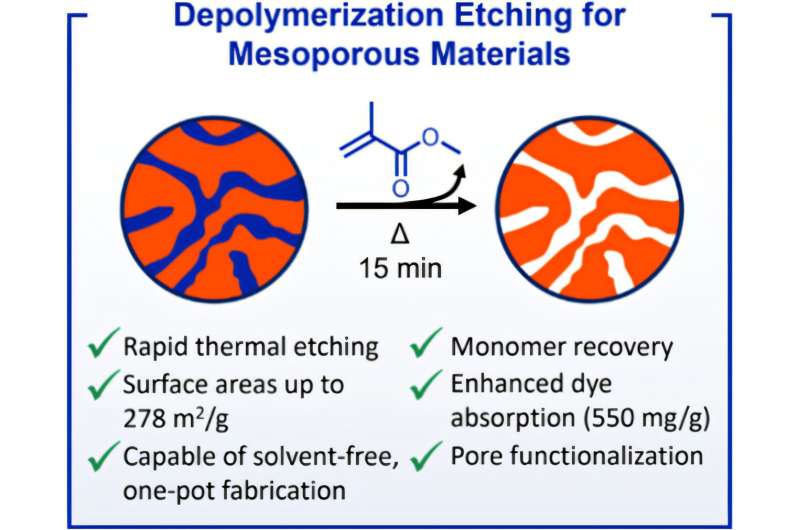Science
Chemists at University of Florida Innovate Advanced Materials from Plastics

Chemists at the University of Florida have created a groundbreaking technique to transform basic plastics into advanced materials with significant potential in various industries. This innovative method allows for the production of highly porous materials, which could find applications in electronics, battery manufacturing, and water purification.
The research team, led by Brent Sumerlin, Ph.D., published their findings on November 4, 2025, in the journal ACS Central Science. Sumerlin described the process as akin to sculpting, where excess material is removed rather than added. “It’s like what a sculptor might do with stone, where you gradually subtract more and more until you have what you want,” he explained. This approach enables the creation of pores inside the material, a feat not achievable by conventional methods.
Porous materials are becoming increasingly important, especially in the battery sector, where they are essential for improving performance. Additionally, they can serve as effective filters for contaminated water and can be adapted for high-density electronic or magnetic storage applications. Sumerlin’s team discovered that by heating a combination of Plexiglass and Styrofoam to specific temperatures, they could create new materials. The Plexiglass components evaporated, leaving behind polystyrene with trillions of tiny gaps, each smaller than a virus. Remarkably, a one-gram sample of this material contained a surface area equivalent to that of a full-sized tennis court.
In advanced manufacturing, maximizing surface area is crucial. “It’s like having a very small mesh in a screen, which is potentially good for purifying wastewater,” Sumerlin noted. He has also filed a patent application for this innovative technique, which could revolutionize the way porous filters are crafted from plastics.
This development not only addresses the challenges of plastic recycling but also highlights the potential for basic research to lead to unexpected applications in diverse fields. The new method of crafting porous filters from plastics could cater to various industries, potentially transforming processes that require the separation of materials.
Sumerlin’s work emphasizes the significance of combining scientific disciplines to create solutions for real-world problems. As the demand for advanced materials continues to rise, this research represents a significant step forward in material science and sustainability.
The full details of the study are available in the article by Kaden C. Stevens et al., titled “Depolymerization as a Design Strategy: Depolymerization Etching of Polymerization-Induced Microphase Separations,” published in ACS Central Science in 2025.
-

 Science3 weeks ago
Science3 weeks agoResearchers Challenge 200-Year-Old Physics Principle with Atomic Engines
-

 Politics1 week ago
Politics1 week agoHamas Chief Stresses Disarmament Tied to Occupation’s End
-

 Science1 week ago
Science1 week agoOhio State Study Uncovers Brain Connectivity and Function Links
-

 Top Stories1 week ago
Top Stories1 week agoFederal Agents Detain Driver in Addison; Protests Erupt Immediately
-

 Entertainment1 week ago
Entertainment1 week agoMegan Thee Stallion Exposes Alleged Online Attack by Bots
-

 Entertainment2 weeks ago
Entertainment2 weeks agoSyracuse Stage Delivers Lively Adaptation of ‘The 39 Steps’
-

 World3 weeks ago
World3 weeks agoGlobal Military Spending: Air Forces Ranked by Budget and Capability
-

 Top Stories1 week ago
Top Stories1 week agoWill Smith Powers Dodgers to World Series Tie with Key Homer
-

 Politics3 weeks ago
Politics3 weeks agoNHP Foundation Secures Land for 158 Affordable Apartments in Denver
-

 Top Stories1 week ago
Top Stories1 week agoOrioles Hire Craig Albernaz as New Manager Amid Rebuild
-

 World2 weeks ago
World2 weeks agoBoeing’s Aircraft Production: Assessing Numbers and Challenges
-

 Lifestyle1 week ago
Lifestyle1 week agoTrump’s Push to Censor National Parks Faces Growing Backlash









